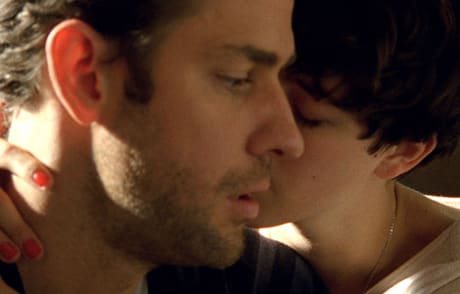Ry Russo-Young's third feature, Nobody Walks, has an appealing façade: a script co-written with Lena Dunham of Girls and Tiny Furniture fame; a strong cast of charming actors, including the always impeccable Rosemarie DeWitt; and a Sundance seal of approval.
Martine (Olivia Thirlby), a 23-year-old so-called artist from New York City, comes to stay with Peter (John Krasinski) and Julie (DeWitt), friends of a friend, to get help adding sound to her video installation about insects. This not unfamiliar premise unfolds without too many surprises — the presence of this virtual stranger sets the stage for the inevitable unfolding of flirtations, desires and dalliances.
From the opening scene, Martine possesses an uncanny ability to attract men, but that charisma isn't palpable onscreen. We find little particularly compelling about her: she isn't extraordinarily talented, beautiful or insightful. Perhaps it is Martine's very blank-paged-ness that attracts the opposite sex — she's a cipher onto which they can project their fantasies.
While Martine is never without male attention in Nobody Walks, she isn't absorbed by, or invested in, her sexual activity. She acquiesces to others' sexual wills and whims more than she actively pursues them. When Martine initiates intimacy with a man, her interest is driven by insecurity or escapism — the need to feel wanted, the need to combat criticism, the need to repress feelings of failure or helplessness — not passion. Had Russo-Young and Dunham more fully developed Martine's character so that we empathize with her as a person, rather than as the plot's lynchpin, they would have been better able to explore this sexual terrain in a way that built connections.
While Nobody Walks shows gaps in character motivation and development (for example, given the lack of chemistry between Peter and Martine, his feelings for her seem delusional), it also shows great promise. Russo-Young and Dunham aren't afraid of subtext; they don't judge their characters' decisions and they are confident enough not to force too many events into the film.
Nobody Walks is lovely to look at and wonderful to listen to (sound plays a large role in this film — the rustling of clothes, running water in a bathtub, skin touching skin — bringing its only traces of sensuality), but it feels incomplete and underwhelming. The intriguing subplots, especially those involving Julie's teenage daughter, Kolt (India Ennenga), and Julie's unnamed male patient (Justin Kirk), deal with the complexities of lust and longing in a more believable and engaging manner than the main story.
When, near the film's conclusion, Kolt reads her poem to her unseemly Italian tutor ("All the ladies in town with their secret things that they want… You will never have anything or anyone you want, least of all me"), there is a sense of just how much insight into the elusive power of desire has gone untapped.
(Magnolia)Martine (Olivia Thirlby), a 23-year-old so-called artist from New York City, comes to stay with Peter (John Krasinski) and Julie (DeWitt), friends of a friend, to get help adding sound to her video installation about insects. This not unfamiliar premise unfolds without too many surprises — the presence of this virtual stranger sets the stage for the inevitable unfolding of flirtations, desires and dalliances.
From the opening scene, Martine possesses an uncanny ability to attract men, but that charisma isn't palpable onscreen. We find little particularly compelling about her: she isn't extraordinarily talented, beautiful or insightful. Perhaps it is Martine's very blank-paged-ness that attracts the opposite sex — she's a cipher onto which they can project their fantasies.
While Martine is never without male attention in Nobody Walks, she isn't absorbed by, or invested in, her sexual activity. She acquiesces to others' sexual wills and whims more than she actively pursues them. When Martine initiates intimacy with a man, her interest is driven by insecurity or escapism — the need to feel wanted, the need to combat criticism, the need to repress feelings of failure or helplessness — not passion. Had Russo-Young and Dunham more fully developed Martine's character so that we empathize with her as a person, rather than as the plot's lynchpin, they would have been better able to explore this sexual terrain in a way that built connections.
While Nobody Walks shows gaps in character motivation and development (for example, given the lack of chemistry between Peter and Martine, his feelings for her seem delusional), it also shows great promise. Russo-Young and Dunham aren't afraid of subtext; they don't judge their characters' decisions and they are confident enough not to force too many events into the film.
Nobody Walks is lovely to look at and wonderful to listen to (sound plays a large role in this film — the rustling of clothes, running water in a bathtub, skin touching skin — bringing its only traces of sensuality), but it feels incomplete and underwhelming. The intriguing subplots, especially those involving Julie's teenage daughter, Kolt (India Ennenga), and Julie's unnamed male patient (Justin Kirk), deal with the complexities of lust and longing in a more believable and engaging manner than the main story.
When, near the film's conclusion, Kolt reads her poem to her unseemly Italian tutor ("All the ladies in town with their secret things that they want… You will never have anything or anyone you want, least of all me"), there is a sense of just how much insight into the elusive power of desire has gone untapped.




